TPLO Surgery
Tibial Plateau Leveling Osteotomy
Introduction
The Anterior Cruciate Ligament (ACL) in humans is known as the Cranial Cruciate Ligament (CCL) in dogs. In both the human and canine model, this ligament may tear. Most owners do not know exactly how the tearing occurs in their pet, but they notice lameness. Often, the ligament tear will need to be repaired in dogs who lead an active life. The CCL repairing procedure that we usually recommend is the Tibial Plateau Leveling Osteotomy (TPLO). In our hands, we have found few procedures with a success rate as high as that of the TPLO. Dr. Randy Acker began doing TPLOs in the early 1990′s after learning the TPLO technique from Dr. Barclay Slocum who developed the TPLO.
Clinical Signs Clinical signs of CCL tear in dogs will vary from intermittent lameness with exercise to complete carrying of the leg. The CCL tears can be partial, complete, or complete with a damaged meniscus. A dog with a partial CCL tear may be intermittently lame, and when sitting, the dog often holds the leg out to the side. A dog with a complete CCL tear tends to be three-legged lame for a few days with some improvement as the inflammation resolves. The last phase of a tearing CCL is a damaged meniscus, which will cause the dog to bear very little weight on the leg.
Does my dog need surgery?
Most partial tears will progress to complete tears. Nothing has been discovered to prevent continuing of the tear. Sometimes other decisions are made when patients are old or have multiple problems that may lead to more conservative treatments. Because dogs have more cranial tibial thrust than humans do, they usually do not heal with rest. They may function well enough to get along, but they will continue to be lame without surgery.
Will my dog be able to run again?
Most dogs return to normal or near normal function within six months of surgery. Patients can return to field trial, jogging or any other work they were performing prior to surgery.
Why does it tear?
There is no exact answer available at this time. The current theories include immune mediated disease, narrow intercondylar notch or an infectious disease.
How does the surgery work?
The bone is cut, moved and a bone plate is inserted, making the ligament unnecessary. The medial meniscus also is examined.
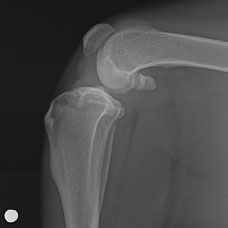
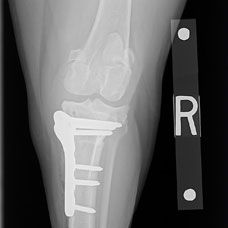
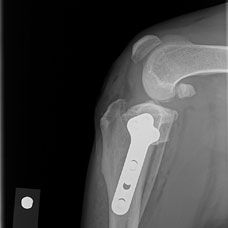
How are we certain about the diagnosis?
All dogs are examined the day of surgery; x-rays are taken of the hips, low back, and both knees. With this information, the best treatment for your dog is determined. Because some dogs have multiple problems, we ask that you are present when these decisions are made.
Is it safe and how painful is it?
The anesthesia used is Isoflurane gas, which is very safe and allows for quick anesthetic recoveries. Pre-operative blood work is performed on all patients to determine their general health and to determine whether or not they are a good candidate for anesthesia. Patient’s vital signs are continually monitored throughout the surgery and pain is managed with a combination of a Morphine epidural, local nerve blocks, anti-inflammatories and a Fentanyl patch.
Does my dog have to spend the night?
Most patients go home on the day of surgery as we find animals are usually much happier at home than they are spending the night in the clinic without their family. In rare cases, we may keep a patient overnight if they need further treatment or if it is requested by an owner.
What are the complications?
The good thing about this surgery is that the complication rate is very low – at a level of less than five percent. Potential problems include future meniscal damage, patellar tendon insertion fracture, infected plates, dislocated kneecaps and others. In some patients, the ligament in the other knee will also rupture at some point in the dog’s lifetime
Learn more about TPLO surgery on Synthes’ website tploanswers.com
To schedule a TPLO, please call 307-201-5700 and make an appointment with our front desk
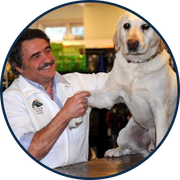
Orthopedic Surgery
We offer a number of Orthopedic Services, Including TATE™ Canine Elbow Surgery, TPLO Surgery, Hip Replacement, Fractures, and more.
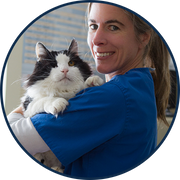
Medicine
We offer all medical and surgical services ranging from routine vaccinations and spays and neuters to bloodwork, ultrasounds, radiographs, exploratory surgery, chemotherapy, MRI and CT scans.
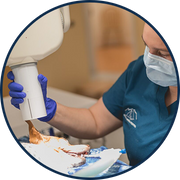
Dental Services
At Jackson Animal Hospital, we specialize in all dental care, from routine cleanings to full mouth extractions, as we believe in the importance of dental health for your pet. Clean and disease free teeth will allow your pet to live a longer and healthier life.
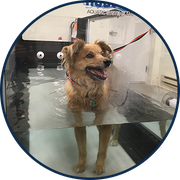
Rehabilitation
Water therapy is an important tool to help animals rehabilitate from orthopedic injuries. We are proud to offer both a Hudson Aquatic Underwater Treadmill as well as a class 3B Laser to assist your pet in recovering to his or her full potential.
